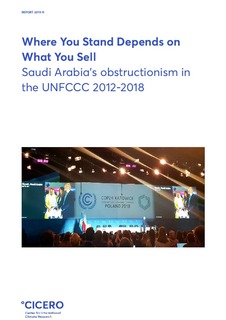Where You Stand Depends on What You Sell – Saudi Arabia’s Obstructionism in the UNFCCC 2012-2018
Report
Published version
Permanent lenke
http://hdl.handle.net/11250/2611866Utgivelsesdato
2019-08Metadata
Vis full innførselSamlinger
- CICERO Reports [210]
Sammendrag
Negotiations on climate change in the United Nations represents the key tool in addressing our time greatest challenge. Countries have negotiated on climate change for decades, and the talks ultimately resulted in the Paris Agreement in 2015. In 2018, the Paris Agreement’s rulebook for implementation was adopted, and the outlook for the new agreement is promising. However, some countries engage in these talks without any intentions to see them succeed. They deploy obstructionist tactics in order to delay progress and derail objectives. A common obstructionist in these negotiations is Saudi Arabia. It has traditionally been one of the most opposing parties to climate action and ambition in the climate change regime. Yet, new developments suggest that Saudi Arabia has revised their traditional climate posture and is now engaging constructively in recent negotiations. This thesis investigates Saudi Arabia’s obstructionist behavior in the climate change negotiations from 2012 to 2018. A content analysis of descriptive reports from the negotiations is conducted. The thesis derives, classifies and analyzes these obstructions in order to determine if Saudi Arabia has truly changed their role as a systematic obstructionist in recent negotiations. The thesis thus reflects upon one of the fundamental questions of state behavior, represented by neo-realism and institutional liberalism. Do states willingly cooperate and ultimately submerge to institutional learning and common interests? The findings of this thesis demonstrate that Saudi Arabia is engaged in a long game in the climate change regime. Obstructions revealed long-held positions related to maintaining their national interests in oil. Based on the findings of this thesis, Saudi Arabia is still a systematic obstructionist in recent negotiations as well.

